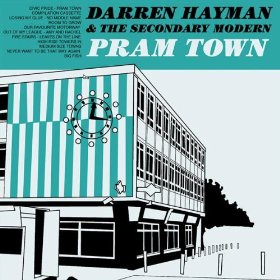Darren Hayman has always picked rich subjects for his music. The potential for heartbreak and the blown-up minutiae of emotion and relationships are juxtaposed with cultural references that are as retrospective as they are forward-facing. With Pram Town, his sixth LP since disbanding Hefner, Hayman has sourced another untapped niche and adapted urban paranoia and a microscopic social awareness for his own ends. Musically too, Hayman adheres also to familiar formulae. So why, then, might we describe this as one of his finest works to date?
There are several reasons. This sealed sanctuary of Harlow that Hayman painstakingly evokes (not least in the inlay, which details the town’s rapid gestation from the fifties onwards) forms his most coherent setting since Hefner’s We Love The City. Harlow (the Essex town in question) represents lofty hopes and dreams that eventually become dated, and not quite as was first intended. It’s the perfect Hayman muse. His lyrics revel in references to the straight roads, the pristine concrete, the modern civic amenities. Crucially, though, he is quick to satirise. "You’ll wonder how you did without, this is everything we’ve always dreamt about," he sings of the extensive cycle lanes. It’s mostly affectionate and when, on ‘Leaves On The Line’, he decides he finally wants to leave this new town to follow his love (why else?), we can be confident that he does so with a heavy heart.
The love he follows is introduced early on. Rather than have this light narrative dictate the flow of the record, it is revealed via the odd snippet. It’s a device that works very well, and the gentle, yearning bob of their first encounter on ‘Compilation Cassette’ is rung in with a quiet chorus of ukulele and acoustic plod. This encounter, as is often the case with Hayman, is all hung-over berk charms sassy sexpot with nothing but knowledge and circumstance. The natural succession of ‘No Middle Name’ is just about the dreamiest recording of Hayman’s career and finds him in wistful voice, no doubt enjoying the tree-covered boulevards of his municipal second love who.
‘Room To Grow’ spells out the fears and dark times that always lie on the road to happiness, and works well as a reminder of the cruelty necessary to balance this ultimately delicate record. This is fortunate, for you wouldn’t want to solely hear Hayman in cloying mode – it’s always best to be reminded what a dirty fellow he can be.
We flit between the love and the town and the town and the love until leaving becomes the only option on ‘Big Fish’ ("life here got way too brown…"), and thank goodness. It’s at times ruthless entertainment, but the intelligence of the construction leads the listener to the occasional nagging suspicion that they’ve been this silly at some point too, for Darren Hayman is a fine crafter of sweet regret as there ever has been. Yet this is offset by the Harlow location, and if we’re to stumble through the emotional and physical territory of the titular town, we couldn’t ask for a better guide.


